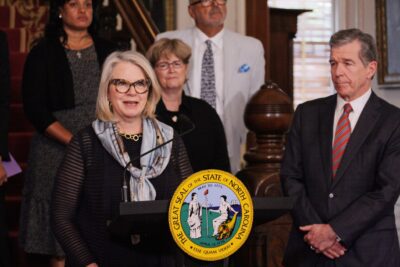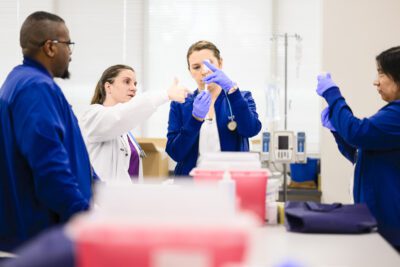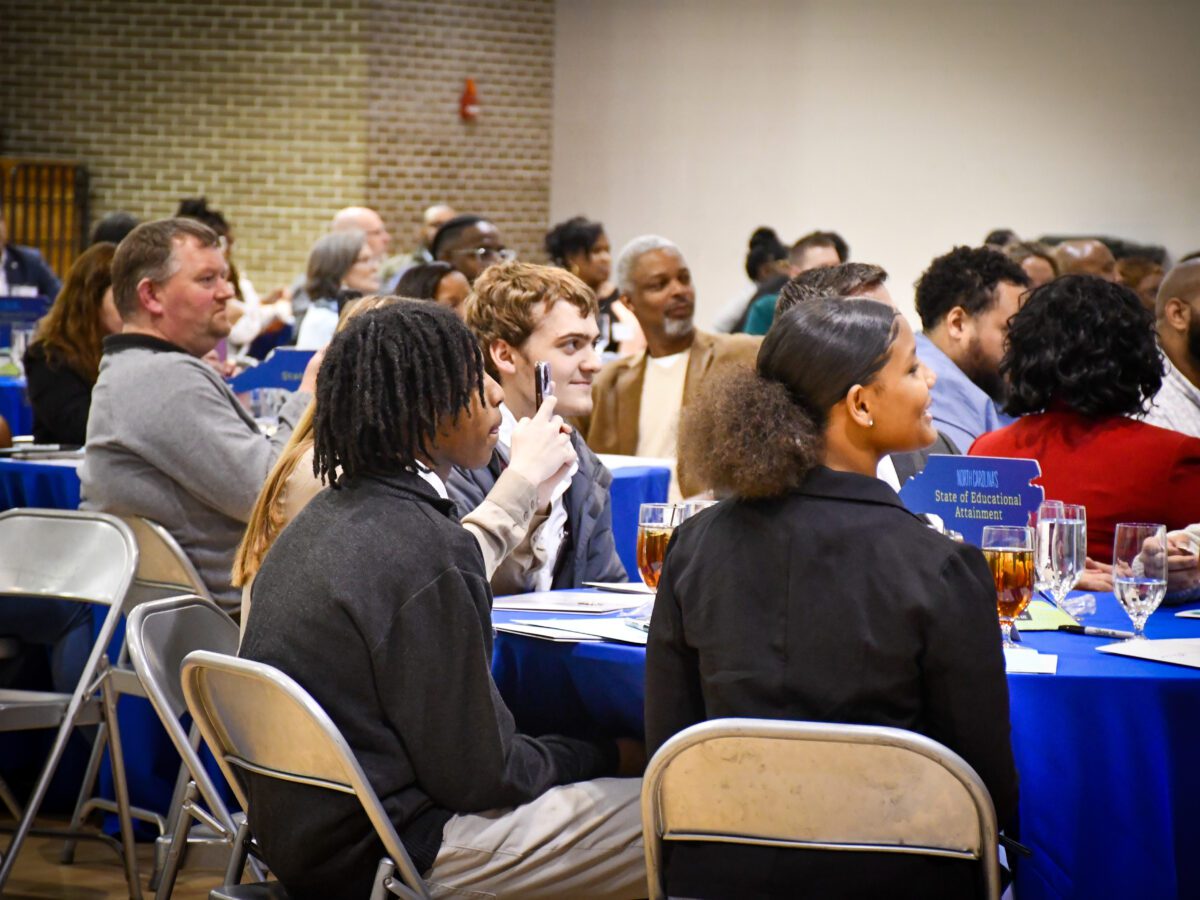
|
|
On Feb. 15, myFutureNC hosted eight regional convenings across North Carolina, bringing together education, government, business, and community leaders to discuss the state of educational attainment.
The convenings mark five years since myFutureNC announced a statewide attainment goal of 2 million 25- to 44-year-olds with a high-quality credential or postsecondary degree by 2030. A new report released in conjunction with the convenings outlines how far North Carolina has come since then, and what remains to be done to reach the goal.
“From 2019 to 2022, the state has increased overall educational attainment by 4 percentage points from 53.4% to 57.4%,” the report reads. “But, most recent data show we still remain 391,900 away from 2 million, and are tracking 24,096 behind where we needed to be at this point in time to reach the goal.”
If North Carolina continues on its current path, the state will be short of its 2 million goal by 71,186 in 2030, according to the latest census data.

At each convening, myFutureNC shared regional data to help local stakeholders determine more ways to increase educational attainment by region.
Additionally, myFutureNC highlighted three policy recommendations they are advocating for to help North Carolina reach its attainment goal. Those include:
- Additional emergency assistance funds to help students persist to completion of their college degree.
- Additional funds through N.C. Workforce Credentials to boost enrollment through financial aid for students pursuing industry-valued credentials, including trade jobs. As it currently stands, federal and state aid can not be used to cover non-degree credentials, making it unaffordable for students.
- Funding to support local and regional collaboratives to pursue innovative approaches that can help increase attainment across the state.
“The number of students not achieving a degree or industry-valued credential within six years is less than a third of all North Carolina high schoolers, yet we know that two-thirds of our jobs require higher levels of education. North Carolina is losing too many of our students along this leaky pipeline, and we must do better. By tackling this at the local level, we believe this will provide solutions that are unique to each community,” said Cecilia Holden, president and CEO of myFutureNC, in a press release.
The eight regional convenings were hosted at the following community colleges and featured the following speakers:
- Central Carolina Community College | Gary Salamido, President & CEO, North Carolina Chamber of Commerce
- Roanoke-Chowan Community College | Secretary Machelle Baker Sanders, North Carolina Secretary of Commerce
- Richmond Community College | Cecilia Holden, CEO, myFutureNC
- Cape Fear Community College | Sen. Michael Lee, R-New Hanover
- Forsyth Technical Community College | Rep. Donny Lambeth, R-Forsyth
- Caldwell Community College and Technical Institute (CCC&TI) | John Fraley, Board Chair, myFutureNC
- Central Piedmont Community College | Lynn Good, President & CEO, Duke Energy; Kathryn Black, Strategic Initiatives Executive, Bank of America
- Blue Ridge Community College | Jack Cecil, President & CEO, Biltmore Farms
EdNC’s Nation Hahn and Emily Thomas attended the convenings at Caldwell Community College and Technical Institute (CCC&TI) and Roanoke-Chowan Community College, respectively.
Attendees worked together to dig in on localized attainment data — including regional data and trends, their local county’s attainment profile, and more. Each participant was also asked to write their own headline and share it on social media. You can see those on X, formerly Twitter, at #2millionby2030.
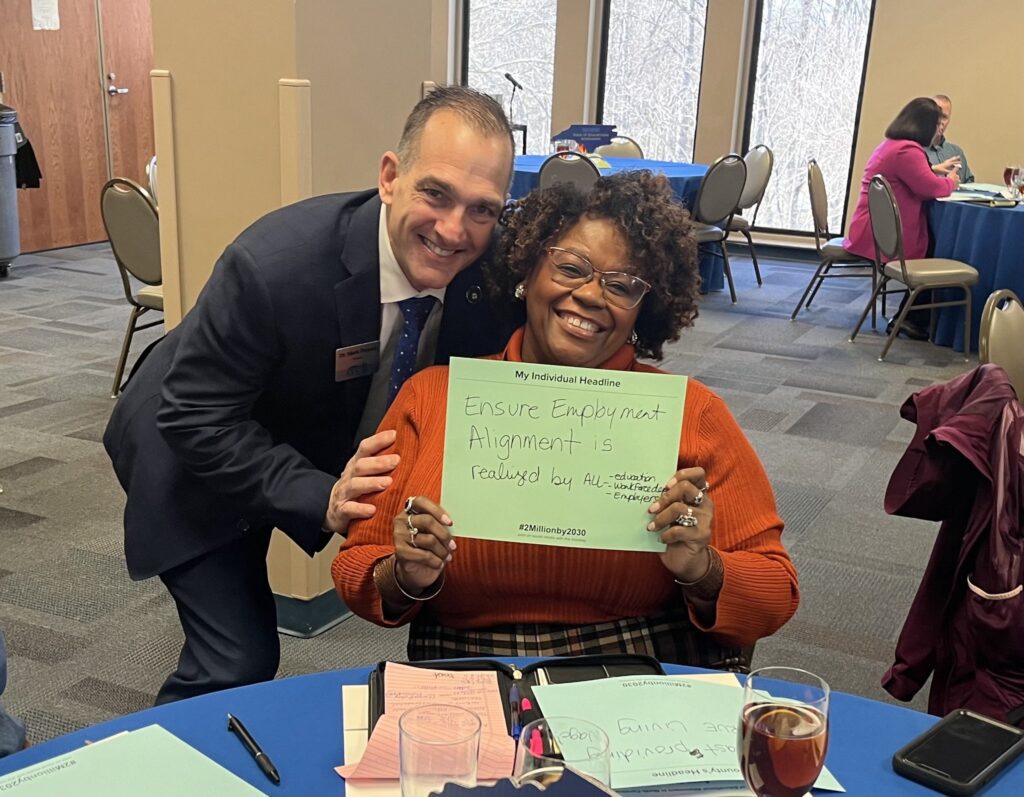
Attendees at the convenings also viewed the following keynote video featuring myFutureNC Board Chair John Fraley and CEO Cecilia Holden.
Attendees of the northwestern regional convening gathered at the J.E. Broyhill Civic Center in Lenoir. Speakers for the event included CCC&TI President Dr. Mark Poarch, myFutureNC Board Chair John Fraley, and Rep. Destin Hall, R-Caldwell, Watauga.
Poarch opened the event by reminding attendees of why they were there: our students. Poarch introduced Meredith Wilson, a recent graduate of CCC&TI, as an adult learner. Wilson earned a degree in massage therapy at the college, worked for a decade in the field, and eventually ended up in the Welding Technologies Associate Degree program at the college.
“Meredith came into the welding program with the goal of making life better for herself,” Poarch shared.
Wilson now works as a safety specialist at FleetGenius, a sustainable waste container company here in Lenoir. She collaborates with local high schools and the community college, telling the story of the company’s apprenticeship program.
Wilson told the CCC&TI team that she is in her dream job and believes firmly that the college made it possible for her.
“Meredith and the many thousands of students like her in our region and our state are why we are here today. They are our why,” declared Poarch.
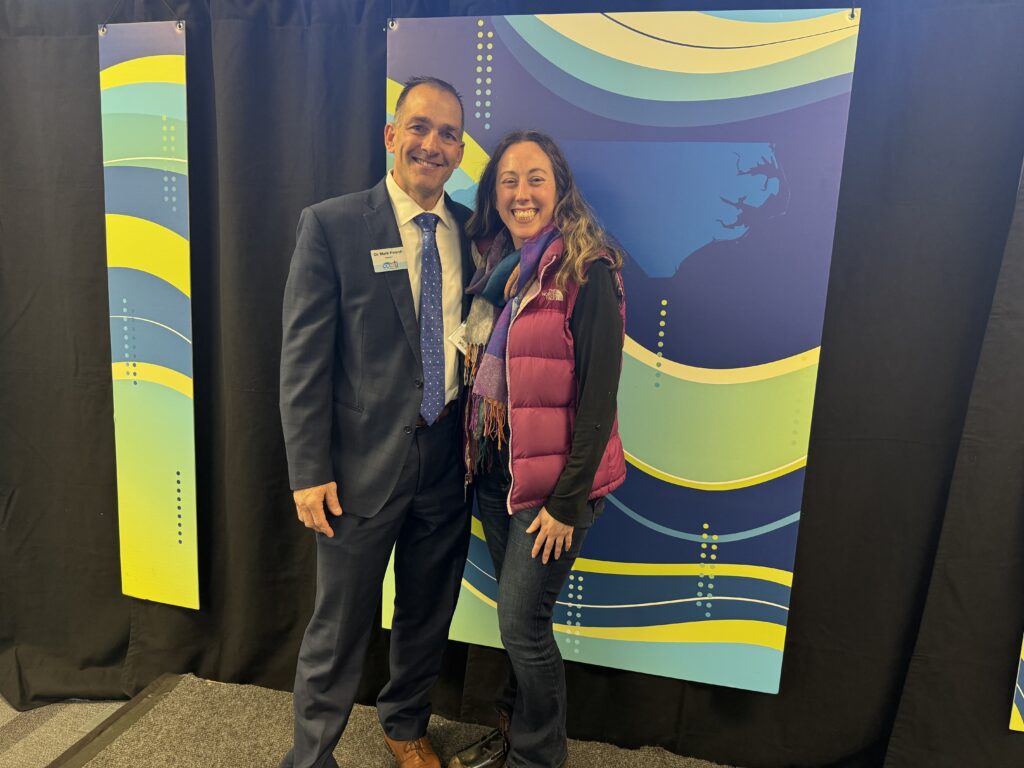
The convenings also featured videos showing the “leaky education pipeline” for each region. The video for the northwest region is below.
Attendees of the northeastern regional convening gathered at Roanoke-Chowan Community College. Speakers for the event included Roanoke-Chowan President Dr. Murray Williams, myFutureNC Board Member Marshall Cherry, myFutureNC Regional Impact Manager Dr. Angie Jenkins, Director of Economic & Policy Analysis at the North Carolina Department of Commerce Jeff DeBellis, and North Carolina Secretary of Commerce Machelle Baker Sanders.
Williams opened the convening with her statement of purpose. Similar to Poarch, meeting the educational attainment goal for Williams is all about the students.
“Students are my why,” she shared.
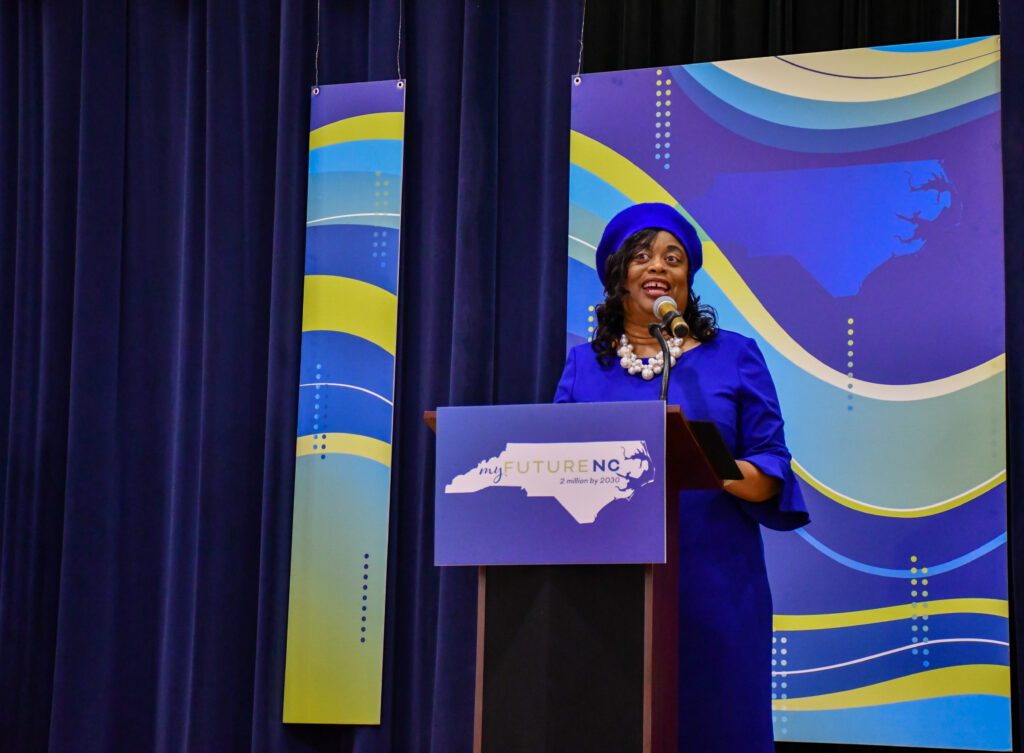
Marshall Cherry said meeting the attainment goal will require a collaborative effort across educational institutions, industry, and other sectors.
“The goal for all of us coming together is to roll up our sleeves –– learn to identify things we can do together that we cannot do alone.”
Marshall Cherry, myFutureNC Board Chair Representative
Each regional convening highlighted market trends, projections, and opportunities. Jeff DeBellis said that in the Northeast, 81% of the five-star jobs in the region require some sort of postsecondary credential to meet the minimum educational requirements to enter.
Attendees were asked to reflect on their county’s attainment data and write down how they could personally contribute at their organization to help meet the state’s 2 million by 2030 attainment goal. Here’s how Cara Equils plans to help her school system.
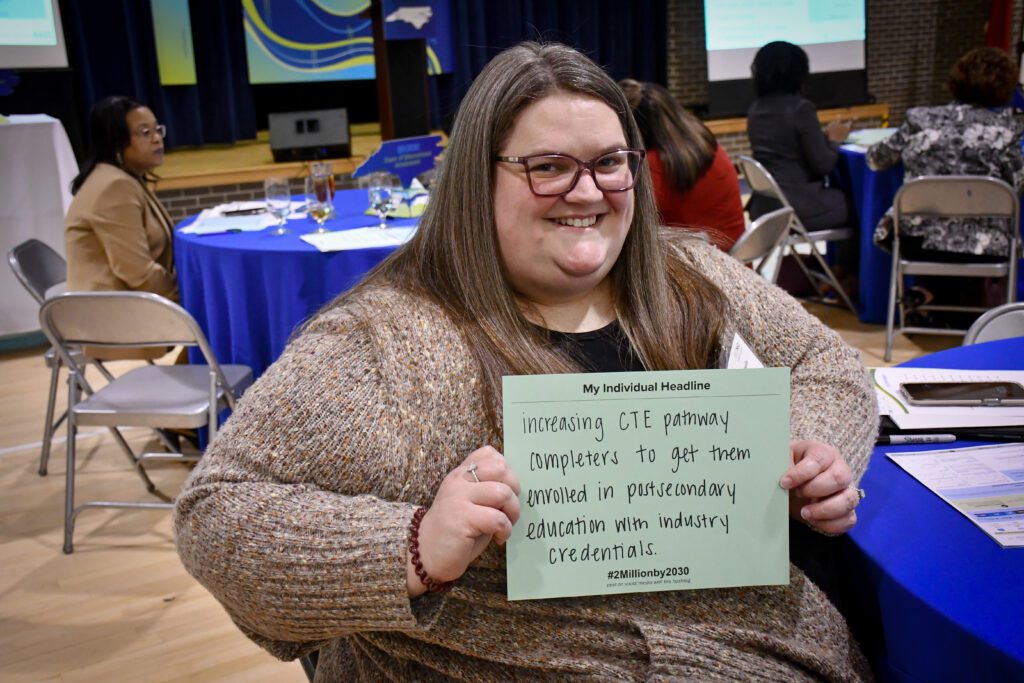
North Carolina’s Secretary of Commerce Machelle Baker Sanders closed the northeastern regional convening. In her remarks, Sanders discussed the importance of investing in the education system and lifted up the direct impact education has on workforce development.
“Public education is workforce development, and workforce development is required for a better way of life, for family sustaining wages and jobs,” Sanders said.
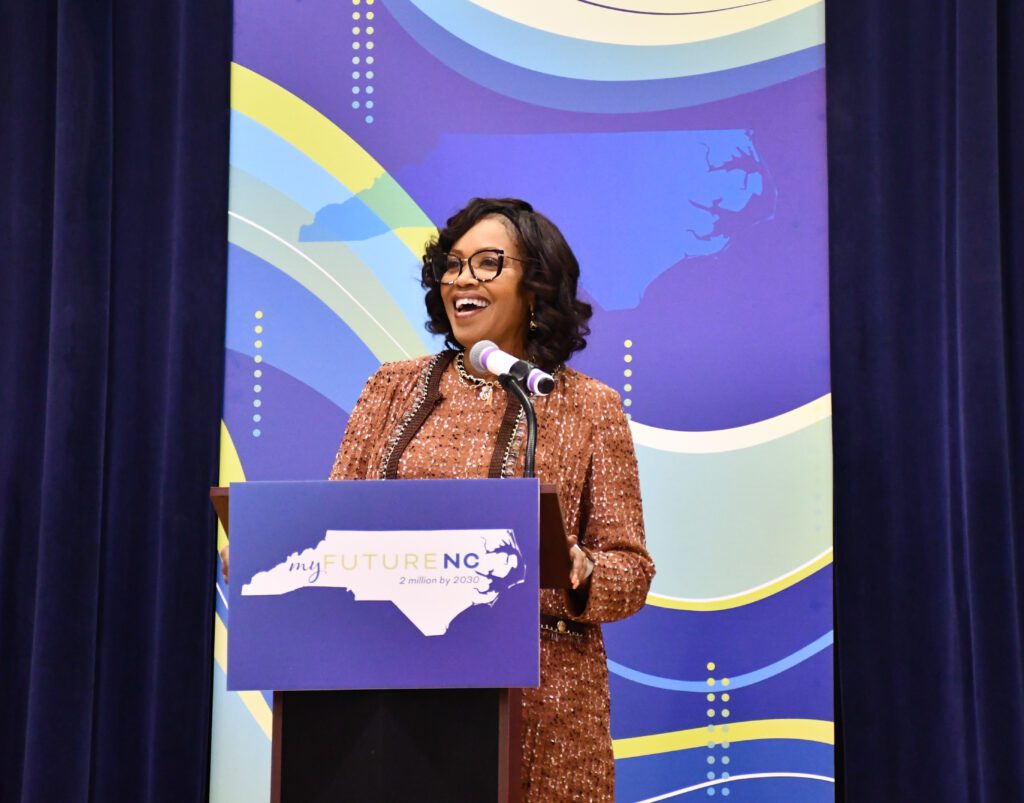
You can view the statewide educational attainment report below.
Editor’s note: The John M. Belk Endowment supports the work of EducationNC.




